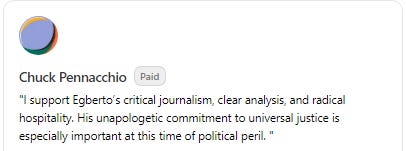Fareed Zakaria gives context to the Right Wing moves against women and ‘those others’ worldwide.
Fareed Zakaria points out that there is a movement around the world from those who cannot fathom the rise of those who were previously powerless — women, POCs, etc.
A quick but important note before reading this prescient article
As of today, we have 9.84 thousand followers and 101 supporting (paid) subscribers. Misinformation funded by the deep pockets of our Oligarchy floods the internet. We are using all of our platforms on-air, online, and in publications to counter that. We ask that you invest the equivalent of less than a coffee to ensure we can keep doing this. Please invest in a Democracy that serves all of us by becoming a paid subscriber. It comes with many benefits.
Fareed Zakaria gives context to the Right Wing moves.
In a recent appearance on “This Week” with George Stephanopoulos, Fareed Zakaria discussed his new book, “Age of Revolutions,” and shared profound insights into the global rise of right-wing movements. He argues that this phenomenon is not confined to the United States but is a worldwide trend affecting countries like Russia, Iran, and Israel. Zakaria posits that these movements are a reaction to the liberalization of women and minorities, which threatens the existing power structures.
Zakaria’s analysis highlights a global cultural shift that has sparked resistance from those who feel threatened by the changing social order. This resistance manifests in various ways, from Russia’s aggression in Ukraine to Iran’s use of proxies to counter American influence in the Middle East. According to Zakaria, these countries are not just afraid of American power but also of American values, which they see as an existential threat to their traditional ways of life.
The interview also touched on the role of identity politics in this cultural upheaval. Zakaria noted that there had been a significant shift in societal norms over the past few decades, with women, minorities, and LGBTQ+ individuals gaining greater visibility and rights. This progress has unsettled many, leading to a cultural backlash. Former President Donald Trump capitalized on these fears in the United States, tapping into a deep-seated anxiety about these social changes.
Zakaria’s observations are crucial for global understanding of the broader context of right-wing movements. However, his emphasis on American leadership in countering this trend may be overstated. While the United States has historically played a significant role in promoting liberal values, it is essential to recognize that its actions have also contributed to the current global tensions.
For instance, U.S. foreign policy in the Middle East, particularly its interventions in Iran, has often exacerbated conflicts and fueled anti-American sentiment. The 1953 CIA-led coup in Iran, which overthrew a democratically elected government and reinstated the Shah, set the stage for decades of turmoil. This history is often overlooked in mainstream narratives that paint Iran solely as an adversary without acknowledging the complexities of its relationship with the West.
Similarly, the U.S. has supported regimes and policies that have undermined human rights and democracy in other parts of the world. These actions have contributed to the very instability and backlash that Zakaria describes. Acknowledging this history is crucial for a more nuanced understanding of global dynamics and the challenges facing liberal democracies today.
Moreover, Zakaria’s focus on American exceptionalism in promoting liberal values overlooks the contributions of other nations. Many countries, including those with significant Muslim populations, have made strides in gender equality and minority rights. For instance, Pakistan and Bangladesh have had female heads of state, and India elected its first female prime minister, Indira Gandhi, in 1966. Mexico recently elected a woman to lead them. In contrast, the United States has yet to elect a woman as president.
Conclusion
This discrepancy highlights the need for a more humble and collaborative approach to addressing global challenges. The U.S. can learn from the successes and failures of other countries in promoting gender equality and human rights. By working together, nations can build a more inclusive and just world.
Can we count on you to help us reach our goal of 25 new paid subscriptions by month’s end?
The other side has big donors and everyday citizens who invest heavily in platforms that lie and misinform. All we have is you. So, please invest in our media outlet by clicking the subscribe button below to become a paid subscriber. You won’t miss that coffee, but it will make a difference in our politics as we spread the truth about our policies and progressive politics. All paid subscribers get to read my five books on this platform and all subsequent books I write. They will also be privy to subsequent incentives.







